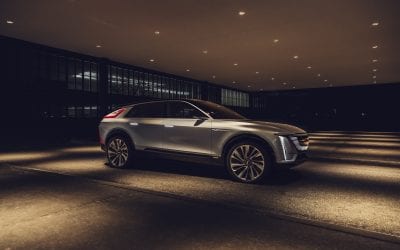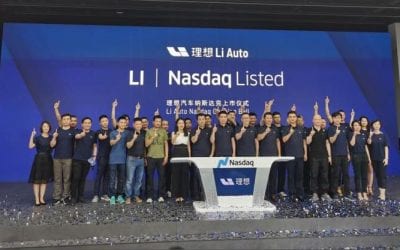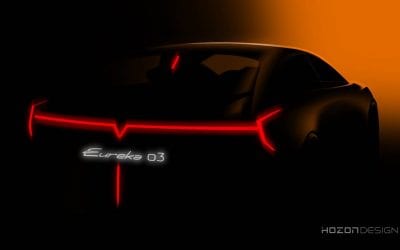
Honda Electric Vehicles
|
Honda CEO, Takahiro Hachigo, commits to a 15% EV and
50% Hybrid target of global sales by 2030. Based on its vision of “Blue
Skies for our Children,” the Japanese
company is working to advance technologies that address society’s
environmental and energy concerns. Center to its strategy the company is
targeting a 50 percent reduction in its total company CO2 emissions on a
global basis by 2050, compared to 2000 levels. The company has been
criticized for its lack of adoption of electric vehicles, as it more
focused on fuel cell technologies. From 2017 it will launch the 3
variants, Fuel Cell Electric Vehicle, Battery Electric Vehicle and Plug-in Hybrid Electric Vehicle in one model series, the Clarity. |
Honda Fuel Cell Electric Models
Honda Concept EV Models
Honda Electric Car Strategy in the news
2019 Week 43 Honda will only sell electrified cars in Europe
Honda announced that it is fast-tracking it's EV strategy for Europe as it announced that it would only sell electrified cars there from 2022, accelerating its plans by three years. A senior vice president at Honda, Tom Gardner, said: "The pace of change in regulation, the market, and consumer behavior in Europe means that the shift towards electrification is happening faster here than anywhere else." Honda's new EV plan includes bringing six new models to Europe by 2022 to meet the European regulatory and consumer demands.
2018 Week 49 Honda to stop selling diesel cars
Honda announced that it would stop selling diesel
cars in Europe and shift focus to electric and hybrid models. Honda has
a dedicated strategy for the European market which is to be the only
region getting the new Honda Urban EV in 2020. The phasing out of
diesel vehicles will be gradual and accomplished by 2021 when the new
Honda Civic comes to market. Honda said it hopes that in 2025,
two-thirds of its models sold in Europe will at least be plug-in hybrids
as it electrifies all its model ranges.
The head of Honda UK, the Japanese automakers biggest market in Europe said to AM Online that two mistakes made by the company over the past decade were pursuing small cars after the recession and not having an EV strategy leaving it without a “foot in the door.” He went further elaborating on the company’s hydrogen strategy, saying “Clearly, Honda thinks hydrogen, but I don’t think that’s going to happen until many, years away when we have genuine hydrogen cars available commercially that aren’t supported by manufacturers,” said Hodgetts. On the Honda Urban EV, he had the following to add, “They will be very expensive cars,” dampening the sales prospects of the city car.
2018 Week 14 Honda and Waymo to partner on self-driving delivery trucks
Waymo CEO John Krafcik in an interview with Bloomberg said that the company is
near completing a deal with Honda to develop autonomous delivery
vehicles. The partnership will follow on that of Jaguar announced last
week. Waymo has already started testing electric trucks in Atlanta last
month.
2017 Week 44 Honda to produce fast charging battery
The Nikkei Asian Review (NAR) reported that Honda
would produce fast charging EVs from 2022. According to the NAR, the
Japanese carmaker is developing EVs capable of a 240km (150 miles) range
from a single 15-minute charge.
2017 Week 42 Honda Concept Vehicles at the Tokyo Auto Show 2017
The Tokyo Auto Show will be hosted from the
27th of October to the 5th of November, and we can expect a bunch of
combustion and electric concept vehicles from regional producers with
the least amount of production electric vehicles. Hopefully, we will see
an auto show in Japan in the near future brimming with production-ready
electric vehicles, in the meantime here are some of the
concept electric and autonomous vehicles which would be displayed at the
2017 event.
Honda Concept Vehicles at the Tokyo Auto Show 2017
Honda is set to unveil its new Sports concept, combining AI and electrification which is built on the same platform as the Honda Urban Concept. Honda announced in Week 37 that it intends to produce the Honda Urban Concept in 2019 for the European market as it tries to hasten its EV strategy for the EU.
Honda will also showcase its vision for autonomous electric mobility with the Honda NeuV which explores autonomous car sharing as an application.
The Japanese carmaker is also a popular motorcycle manufacturer and will unveil the electric Honda Riding Assist E at a World Premiere event during the Tokyo Auto Show. According to Honda, the Riding Assist-e features its unique balance control technology, developed through humanoid robot research. The motorcycle automatically balances itself at very low speeds, reducing rider load.

2017 Week 38 Honda hastens its EV strategy in Europe
Honda announced in a press release that the aims to reach a sales target for
EVs of two-thirds by 2025 in Europe, five years sooner than for its
global target. The Japanese carmaker aims to achieve this target through
releasing a pure electric and plug-in electric vehicle with each new
model release from 2019.
2017 Week 37 Honda Urban concept set for production in 2019
Honda unveiled its Urban EV concept with the intent to launch it in Europe and possibly other markets in 2019.
2017 Week 24 Honda Clarity lease price set
Honda announced that it would release the Honda Clarity Electric in Oregon and California later this year on a three-year lease for $269 per month.
2017 Week 23 Honda finally unveils its EV strategy
Honda released its mid-term strategy, Vision
2030, this week as the company plays catch-up to the rest of the market
as most of the Japanese automaker’s competitors have already formulated
strategies for autonomous and electric vehicles through 2025. Like most
of its peers in Japan and Korea, Honda placed its bets on hydrogen fuel
cell vehicles, losing valuable runway on the electric vehicle trajectory
that most of the sector now find themselves on.
Reuters quoted CEO, Takahiro Hachigo “We’re going to place utmost priority on electrification and advanced safety technologies going forward,” as Honda acknowledged it must look beyond conventional cars to survive. The company targets to have new energy vehicles contribute two-thirds of its model range by 2030, up from 5% currently. Honda has employed nearly $7 billion in R&D spend by March 2018 to support its strategy.
2017 Week 9 Honda setting itself up for epic failure with its first EV sedan
Honda is setting itself up for failure with this week’s announcement that the much anticipated mid-sized 2018 Honda Clarity
EV will only have an 80-mile range. Despite being a mid-size sedan,
with the obvious space benefit it brings, the car will not even compete
with smaller compact sedans and hatchbacks, such as the 2017 BMW i3 (114 miles), Nissan Leaf (107 miles) and the VW e-Golf (125 miles). The Honda Clarity EV’s direct competitors in the $30,000 to $35,000 price range, the Hyundai Ionic (124miles) and Tesla Model 3 (200 miles), will put it to shame.
2017 Week 7 Forecast for electric vehicle participation increases, Honda's strategy not alligned
The respected Economist Magazine this
week commented on forecast adjustments by various investment houses for
the penetration of electric vehicles. Up till last year, the consensus
was that only 4% of new vehicles would be electric by 2025. BNP Paribas
now forecast 11% penetration by 2025, while Morgan Stanley see’s a 7%
penetration. In 2016 international EV sales increased with nearly
750,000 units (42%) in spite of a low fuel price environment. One factor driving the change of heart are aggressive regulations to support environmental targets. In Norway electric vehicles now makes up 37% of new vehicle fleet amid government support while in China the Government aims to have EV’s make up 8% of new vehicles by 2018. Technology has also moved much faster than anticipated and battery cost, a long time stumbling block is coming down faster than anticipated, with some mega factories coming online within the next two years. Our hearts go out to the automakers that failed to notice the trend, RIP Fiat, Toyota, Honda, Hyundai, and the list goes on, not to mention Big Oil.
2017 Week 6 Honda and Hitachi creates JV to build electric motors
Honda and Hitachi announced the formation of a joint venture to develop and produce electric motors for the electric vehicle sector. The tactic is part of Japan’s third-largest automaker strategy to have new energy vehicles as two-thirds of its product lineup by 2030.
2017 Week 3 Honda branded for just complying to minimum regulations.
A report just released by the Californian Air Resouces Board indicated that advancement in electric vehicle technology is happening at a much faster pace than anticipated five years back. The report highlights the efforts by Tesla and Chevrolet
to bring affordable and long-range vehicles to the market. The report
found expanding charging networks, advancements in battery performance,
decreasing cell costs, and the number of models available to the
consumer as factors for the improved results. On the other hand, the Board states that not all automakers attack the challenges with the same vigor, with Honda and Fiat Chrysler named as company’s that just do the bare minimum to comply with regulations. We predict this will reflect in the various companies share prices five years from now when the next report takes the pulse of the sector.
2016 Week 51 Honda in talks with Waymo on self-driving partnership
Following on the success of the Waymo (Google), Chrysler
partnership automakers are flocking to the technology company to try
and strike deals on self-driving technology. The latest company to
announce that they are in talks with the IT giant is Honda. Honda announced that it approached Waymo to allow its vehicles to join testing in four US cities with Waymo’s self-driving technology. Honda targets commercial self-driving models by 2020. Other automaker’s that tried and failed to partner with Waymo includes Ford and GM.
2016 Week 51 Honda receives a respectable 75% in Auto Brands Customer survey
Honda receives a respectable 75% in Auto Brands Customer survey. Follow the link to see how it faired in comparison to its competition.
2016 Week 27 Honda announced it will not partake in Formual E for the moment
Nico Prost of team Renault e.Dams beat Bruno Senna in the 9th round in the second season of the Fiat Formula-e at Battersea Park in England. The series is hotting up with Faraday and Dragon Racing
announcing a technical partnership where the EV startup will support
Dragon Racing through the next 4 Formula series. The next series starts
on 9 October 2016. In related news, Honda announced that it would wait for the series to grow before it participates.
Top 5 EV News Week 32 2020
Top 5 EV News Week 32 2020 | Cadillac Lyriq unveiled. Yet another Chinese EV startup IPO. Three new EV models launched this week.
Top 5 EV News Week 31 2020
Top 5 EV News Week 31 2020 | Successful IPO for CHJ Auto, Kandi finally enters the USA, Mitsubishi pays the cost for failing EV strategy.
Top 5 EV News Week 30 2020
Top 5 EV News Week 30 2020 | Chengdu Auto Show, Hozon Neta IPO, VW invest in China, eVito Tourer for sale

















